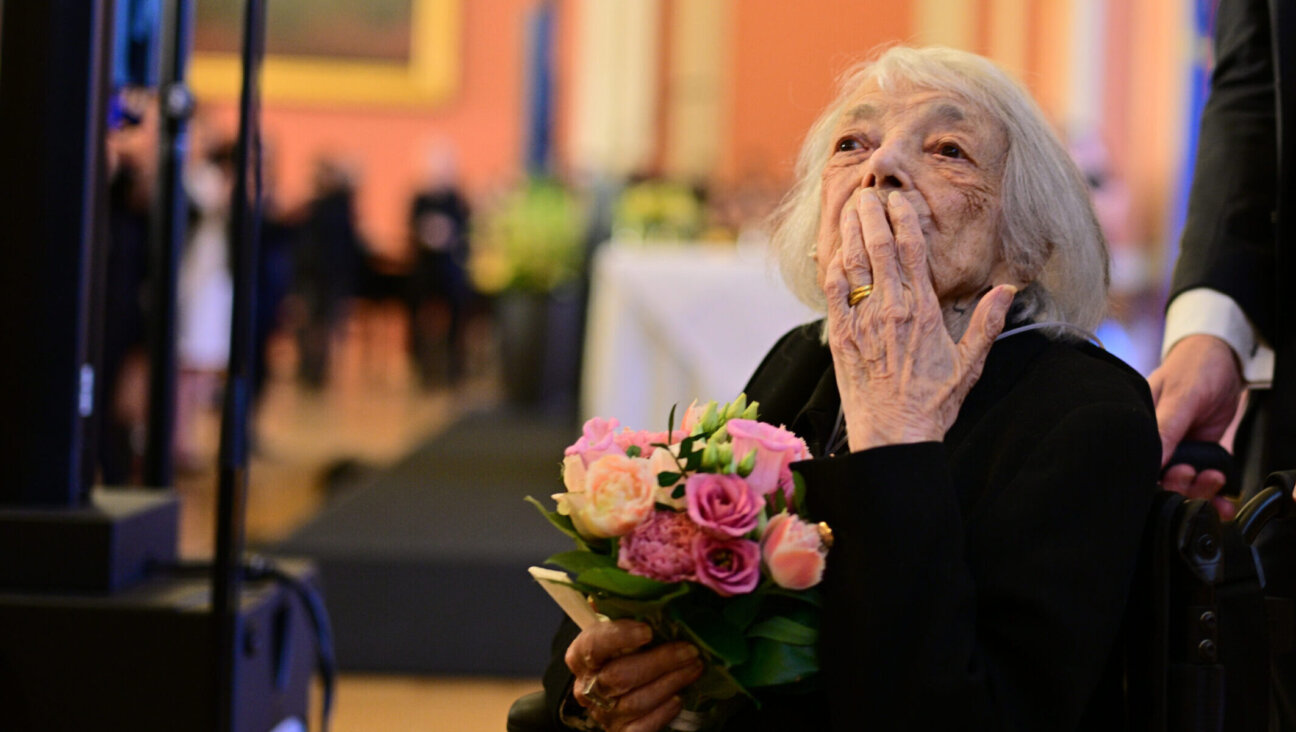The First Ever Chinese-Yiddish Song


While writing her Ph.D. dissertation on Jewish Exile in Shanghai resulting from the Shoah, Yang Meng decided she needed to learn both Yiddish and Hebrew for the sake of her research. A Chinese national already fluent in English and German, once she took on the new languages she found herself fascinated by Yiddish, which she wrote to the Forward “is an indispensible key to understand[ing] Jewish culture.”
As part of her studies she participated in the 2015 Naomi Prawer Kadar International Yiddish Summer Program at Tel Aviv University. For that program’s closing ceremony she performed a song that was entirely unique: a Yiddish rewriting of a classic Chinese song, which she had translated into Yiddish with the assistance of Yuri Vedenyapin, a Yiddish language instructor based at Harvard.
The lyrics of the Chinese song, Liang Hongzi’s 1983 “Wishing We Last Forever,” is a musical setting of a poem by Su Shi, famed Chinese poet and essayist, written in 1076. “This song ‘Chinese Moon Over Tel Aviv’ is the first Chinese-Yiddish song in human history,” Meng wrote. “I am very attracted to the mamaloshen”—Yiddish for ‘the mother tongue—“and I hope I can bring Yiddish language and culture to my beloved China.”
In an English translation by Xu Yuanchong, Shi’s poem reads:
*”How long will the full moon appear?
Wine cup in hand, I ask the sky.
I do not know what time of the year
’Twould be tonight in the palace on high.
Riding the wind, there I would fly,
Yet I’m afraid the crystalline palace would be
Too high and cold for me.
I rise and dance, with my shadow I play.
On high as on earth, would it be as gay?
The moon goes round the mansions red
Through gauze-draped window soft to shed
Her light upon the sleepless bed.
Why then when people part, is the oft full and bright?
Men have sorrow and joy; they part or meet again;
The moon is bright or dim and she may wax or wane.
There has been nothing perfect since the olden days.
So let us wish that man Will live long as he can!
Though miles apart, we’ll share the beauty she displays.”
Having returned to China from the Yiddish Summer Program, Meng remains active in promoting both Holocaust education and Yiddish and Jewish culture in her home country. She thinks she’s there at the right moment: “Nowadays,” she wrote, “more and more Chinese are curious about Jewish history and culture.”
And as to her songwriting? “This is the first Chinese-Yiddish song in human history,” she wrote, “and will certainly not be the only one.”
Talya Zax is the Forward’s culture intern
The Forward is free to read, but it isn’t free to produce

I hope you appreciated this article. Before you go, I’d like to ask you to please support the Forward.
Now more than ever, American Jews need independent news they can trust, with reporting driven by truth, not ideology. We serve you, not any ideological agenda.
At a time when other newsrooms are closing or cutting back, the Forward has removed its paywall and invested additional resources to report on the ground from Israel and around the U.S. on the impact of the war, rising antisemitism and polarized discourse.
This is a great time to support independent Jewish journalism you rely on. Make a gift today!
— Rachel Fishman Feddersen, Publisher and CEO
Support our mission to tell the Jewish story fully and fairly.
Most Popular
- 1

Fast Forward Ye debuts ‘Heil Hitler’ music video that includes a sample of a Hitler speech
- 2

Opinion It looks like Israel totally underestimated Trump
- 3

Culture Cardinals are Catholic, not Jewish — so why do they all wear yarmulkes?
- 4

Fast Forward Student suspended for ‘F— the Jews’ video defends himself on antisemitic podcast
In Case You Missed It
-

Fast Forward Margot Friedlander, German Holocaust survivor who landed a Vogue cover, dies at 103
-

Culture Is this heaven or is it New Jersey? 9 innings of the Jewish-American pastime
-

Culture How one Jewish woman fought the Nazis — and helped found a new Italian republic
-

Opinion It looks like Israel totally underestimated Trump
-
Shop the Forward Store
100% of profits support our journalism
Republish This Story
Please read before republishing
We’re happy to make this story available to republish for free, unless it originated with JTA, Haaretz or another publication (as indicated on the article) and as long as you follow our guidelines.
You must comply with the following:
- Credit the Forward
- Retain our pixel
- Preserve our canonical link in Google search
- Add a noindex tag in Google search
See our full guidelines for more information, and this guide for detail about canonical URLs.
To republish, copy the HTML by clicking on the yellow button to the right; it includes our tracking pixel, all paragraph styles and hyperlinks, the author byline and credit to the Forward. It does not include images; to avoid copyright violations, you must add them manually, following our guidelines. Please email us at [email protected], subject line “republish,” with any questions or to let us know what stories you’re picking up.
















